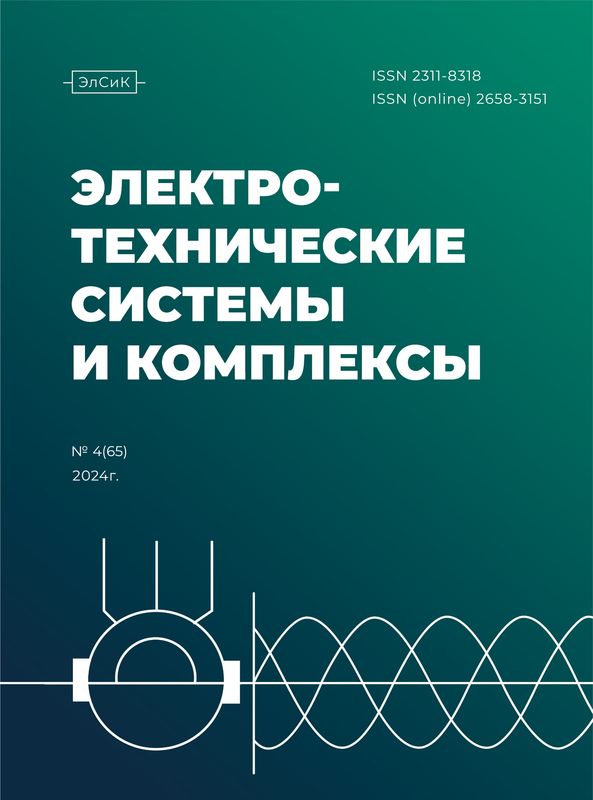Abstract
The issues of assessing the effectiveness of using automated adaptive energy saving systems at industrial enterprises are considered. The difficulty of solving this issue for adequately assessing the effectiveness of energy saving devices of various types is shown. It is not correct to compare meter readings when energy saving devices are on and off due to rapidly changing loads. In addition, it is advisable that the process of assessing the effectiveness of using such devices be automated. This paper presents an algorithm for conducting efficiency tests by selecting sections of identical loads, focusing on the current values when the energy saving device is turned on and off. When an energy saving device is turned on or off, the current in the network changes due to reactive power compensation. Since when the device is turned on, the mode is reached gradually (therefore the load can change significantly), it is recommended to record the change in current when the device is turned off, since it is unlikely that the load will change significantly. Next, the power consumption values are compared, but when the device is turned on, the current should be lower by a previously determined value. To assess the effectiveness of using energy-saving devices at remote enterprises without physically connecting energy-saving devices, formulas have been developed to evaluate their effectiveness. As a result, in this article, a methodology has been proposed for assessing the effectiveness of using energy-saving devices at enterprises at the stage of preliminary tests using analyzers of energy network quality parameters; an algorithm has been developed for automated assessment of the current efficiency of using energy-saving devices in the process of their constant operation with the transfer of information to terminal devices of enterprises; relationships have been developed to assess the efficiency of using energy-saving devices based on data on network parameters received from enterprises; an algorithm has been proposed for automated assessment of the effectiveness of using energy-saving devices based on the use of developed relationships with the transfer of information to terminal devices of enterprises.
Keywords
energy saving, current, power, voltage, automation, compensation, reactive power, distortion, harmonics, power quality analyzers, power factor, correlation
1. Federal Law of November 23, 2009 No. 261-FZ "On Energy Saving and Improving Energy Efficiency and on Amending Certain Legislative Acts of the Russian Federation". Rossiyskaya gazeta. Federal'nyy vypusk [Rossiyskaya Gazeta. Federal issue], 2009, no. 226 (5050), pp. 19-21. (In Russian)
2. Samokhin V.I., Samokhin D.V., Sukhostavskii I.V., Babkin E.E. Main directions of energy saving at enterprises and equipment used for energy saving. Elektronnye informatsionnye sistemy [Electronic information systems], 2020, no. 1(24), pp. 63-76. (In Russian)
3. Radkevich V.N., Tarasova M.N. Evaluation of the degree of reduction of active power losses in power lines with reactive power compensation. Energetika. Izvestiya vysshikh uchebnykh zavedeniy i energeticheskikh obyedineniy SNG [Energetika. Proceedings of CIS higher education institutions and power engineering associations], 2016, vol. 59, no. 1, pp. 5-13. doi: 10.21122/1029-7448-2016-59-1-5-13 (In Russian)
4. Samokhin D.V. Local controlled energy saving system. Elektronnye informatsionnye sistemy [Electronic information systems], 2020, no. 4 (27), pp. 41-47. (In Russian)
5. Venkata B.R., Dayasagar S.C., Venkata G.R. Analysis of Active and Passive Power Filters for Power Quality Improvement under Different Load Conditions. International Journal of Advanced Research in Electrical – Electronics and Instrumentation Engineering. 2014, no. 8, рp. 11102-11115.
6. Schreiner R.T., Efimov A.A. An active filter as a new element of electric drive energy-saving systems. Elektrichestvo [Elektrichestvo], 2000, no. 3, pp. 46-54. (In Russian)
7. Kamolov M.M., Abdulkerimov S.A., Nazirov H.B., Dzhuraev Sh.J., Ismoilov S.T. Taking into account the non-sinusoidal/asymmetric mode of operation of the electric utility network when calculating the current level of the zero conductor. Elektrichestvo [Elektrichestvo], 2021, no. 1, pp. 35-43. doi:10.24160/0013-5380-2020-1-35-43 (In Russian)
8. Kamolov M.M. Evaluation of asymmetric modes in electrical networks for domestic purposes. Politekhnicheskiy Vestnik. Seriya: Inzhenernye issledovaniya [Polytechnic bulletin. Series: Engineering studies], 2020, no. 3, pp. 29-37. (In Russian)
9. Nazirov K.B., Ganiev Z.S., Dzhuraev Sh.D., Kamolov M.M., Amirkhanov A.S. Measurement of Emissions of High Harmonic Currents in Modern Electrical Receivers in Municipal-Households Power Supply System. IEEE Conference of Russian Young Researchers in Electrical and Electronic Engineering. IEEE, 2020, pp. 1270-1275. doi: 10.1109/EIConRus49466.2020.9039148
10. Nazirov K.B., Dzhuraev Sh.D., Kamolov M.M., Amirkhanov A.S., Ismoilov S.T. Simulation of the Municipal-Household Electrical Supply System for Calculation and Forecasting the Level Current and Voltage Higher Harmonics. IEEE Conference of Russian Young Researchers in Electrical and Electronic Engineering. IEEE, 2020, pp. 1276-1281. doi: 10.1109/EIConRus49466.2020.9038935
11. Nazirov K.B., Dzhuraev S.D., Ganiev Z.S., Kamolov M.M., Ismoilov S.T., Kayumov A.G. Experimental Evaluation and Analysis of Electric Power Quality in Electric Networks Municipal-Households. IEEE Conference of Russian Young Researchers in Electrical and Electronic Engineering. IEEE, 2021, рp. 1491-1494. doi: 10.1109/ElConRus51938.2021.9396351
12. Dzhuraev S.D., Beryozkina S., Kamolov M.M., Safaraliev M., Zicmane I., Nazirov K., Sultonov S. Computation of the zero-wire current under an asymmetric nonlinear load in a distribution network. Energy Reports. 2022, no. 8(8), pp. 563-573. doi: 10.1016/j.egyr.2022.09.176
13. Samokhin D.V., Samokhin V.I., Gureev A.V., Kamolov M.M. Automation of phase (line) voltage imbalance compensation in electric power networks. Oboronnyi kompleks – nauchno-tekhnicheskomu progressu Rossii [Defense complex – scientific and technological progress of Russia], 2023, no. 3 (159), pp. 22-26. (In Russian)
Samokhin D.V. Methodology for Automated Assessment of Adaptive Energy Saving Complex Effectiveness at Enterprises. Elektrotekhnicheskie sistemy i kompleksy [Electrotechnical Systems and Complexes], 2023, no. 4(61), pp. 60-66. (In Russian). https://doi.org/10.18503/2311-8318-2023-4(61)-60-66










